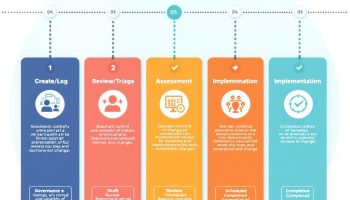
Organizational Change and Consulting Initiatives
Organizational change and consulting initiatives offer structured approaches for businesses undergoing transformations in strategy, processes, and culture. These methodologies help companies implement and maintain meaningful change while reducing disruption and resistance during transitions.
Business Impact and Necessity
Organizational change and consulting services are essential in today’s fast-paced business environment where adaptability determines survival. Companies that manage change effectively through strategic assessment, leadership engagement, and stakeholder communication gain competitive advantages by boosting operational efficiency and workforce productivity.
When implemented correctly, these transformation approaches help organizations reduce risks, address resistance, and create sustainable practices that support long-term success. Harvard Business Review research on organizational change confirms that companies with strong change management protocols consistently outperform their competitors.
By investing in structured change management, businesses can turn potential disruptions into opportunities for growth and innovation. The right organizational change and consulting partner can guide you through challenging transitions while keeping your core business functions running smoothly.
The impact of effective organizational change extends beyond internal operations to customer experience, market positioning, and financial performance. Your ability to adapt quickly to market shifts depends on how well you manage organizational change processes.
70% of organizational change initiatives fail, primarily due to a lack of engagement and communication among stakeholders.
Key Steps for Effective Organisational Change and Consulting: Unlock Success with These 7 Strategies
In the dynamic landscape of business, navigating organisational change requires a strategic approach guided by expert consulting. This section outlines seven vital strategies that organizations can employ to successfully implement change initiatives. From conducting a thorough change assessment to establishing sustainable practices for long-term success, each strategy plays a crucial role in ensuring that transitions are smooth and effective.
Engaging leadership, managing stakeholder communication, and addressing potential resistance are all integral to fostering an environment where change can thrive. By adopting these strategies, organizations position themselves not just to manage change but to embrace it, making way for innovation and improved performance. Let’s explore each of these essential steps in detail.
1. Strategic Change Assessment and Planning
Effective organizational change and consulting begins with comprehensive assessment and strategic planning. You need to conduct thorough organizational readiness assessments to identify areas requiring transformation and gauge preparedness. This critical first step helps you determine if your company can successfully implement proposed changes.
Identifying key stakeholders and impact areas is essential for understanding who will be affected and how. By mapping stakeholder satisfaction requirements, you create a foundation for targeted engagement strategies.
Developing comprehensive change roadmaps provides a clear path forward. Your roadmap should outline:
- Key milestones and deliverables
- Resource requirements
- Timeline expectations
- Risk mitigation strategies
Aligning change initiatives with business objectives ensures your transformation efforts support broader organizational goals. This alignment increases executive buy-in and helps secure necessary resources. When you master strategic planning techniques, your organizational change initiatives have significantly higher success rates.
2. Leadership Engagement and Sponsorship
Effective organisational change and consulting success hinges on strong leadership commitment. When executives actively champion transformation initiatives, they create the momentum needed for lasting impact.
Building executive sponsorship coalitions is crucial for any significant change initiative. By forming a unified leadership front, you establish credibility and demonstrate organizational commitment to the transformation. These coalitions help overcome departmental silos that often derail change efforts.
Training leaders as change champions equips them with tools to guide their teams through transitions. Effective champions understand both the technical and emotional aspects of change, making them invaluable during implementation phases.
Creating accountability frameworks ensures responsibilities are clearly defined and progress is tracked. When leaders understand their specific roles in the change process, they can more effectively:
- Drive implementation within their departments
- Model desired behaviors for their teams
- Remove obstacles blocking progress
- Maintain focus on change objectives
Establishing clear governance structures provides the decision-making framework needed to navigate complex organizational transformations. These structures determine how decisions are made, escalation paths, and who has authority to resolve conflicts that inevitably arise during major change initiatives.
Expert Insight: To drive successful organizational change, secure strong leadership engagement and sponsorship by building coalitions of executive champions. Equip leaders with training to understand the technical and emotional aspects of change, ensuring accountability and clear governance structures to navigate challenges and maintain focus on transformation goals.
3. Stakeholder Communication Management
Effective stakeholder communication is vital during organisational change and consulting initiatives. You need a strategic approach to ensure all parties remain informed and engaged throughout the transformation process.
Developing targeted communication strategies tailored to different stakeholder groups helps drive successful change implementation. Each stakeholder category requires specific messaging that addresses their concerns and highlights benefits relevant to them. Stakeholder satisfaction improves when communications are personalized and timely.
Creating robust feedback channels allows for two-way communication during organisational change. Consider these options:
- Digital platforms like surveys and dedicated portals
- Regular town halls and Q&A sessions
- Anonymous suggestion systems
- One-on-one meetings with key stakeholders
Implementing a consistent communication cadence establishes predictability and builds trust. Schedule updates at regular intervals and maintain this rhythm even when there’s little new information to share. This consistency reassures stakeholders during uncertain periods of change.
Measuring message effectiveness through engagement metrics, feedback analysis, and adoption rates helps refine your communication approach. Track which messages resonate most with different stakeholder groups and adjust accordingly to support your stakeholder engagement approach.
Expert Insight: Maintain consistent, tailored communication with stakeholders during organizational changes to enhance engagement and build trust. Utilize diversified channels for feedback and updates, ensuring messages address specific concerns and benefits. Regularly assess communication effectiveness to refine strategies and improve overall stakeholder satisfaction.
4. Change Impact Analysis in Organizational Consulting
When implementing organizational change and consulting initiatives, identifying affected business processes is crucial to success. A thorough impact analysis helps you pinpoint which workflows will require modification and how they interconnect with other systems. This analysis enables your organization to prioritize changes based on operational importance and dependency relationships.
Assessing technology impacts forms another critical component of change management. You need to evaluate existing systems that will require updates, replacements, or integration with new solutions. This assessment should include risk response strategies to address potential technical challenges during implementation.
Evaluating workforce implications involves analyzing how organizational change and consulting will affect different employee groups. Consider:
- Changes to job roles and responsibilities
- Shifts in reporting structures and team dynamics
- New skills requirements and competency gaps
- Impact on employee morale and engagement
Determining training needs completes your impact analysis by identifying knowledge gaps. Effective project collaboration during this phase ensures you develop comprehensive learning plans that address both technical skills and adaptive capabilities required for successful change adoption.
Expert Insight: In organizational consulting, conduct a thorough change impact analysis to identify affected processes and technology needs. Assess workforce implications to understand job role changes and required skills, ensuring that training plans address knowledge gaps for successful adoption. Prioritizing these elements enhances overall change management effectiveness.
5. Resistance Management
Managing resistance is a critical component of successful organizational change and consulting initiatives. When implementing transformational changes, you’ll inevitably encounter opposition from various sources. Identifying these resistance points early allows consultants to develop targeted mitigation strategies before they derail your project.
Effective consultants begin by mapping potential resistance sources across departments and hierarchical levels. They analyze both overt and covert opposition through surveys, interviews, and stakeholder engagement approaches. This detailed assessment helps you understand the underlying reasons for resistance – whether it’s fear of job loss, comfort with existing processes, or lack of clarity about benefits.
Next, develop comprehensive mitigation strategies tailored to specific resistance types. These might include:
- Creating transparent communication channels
- Providing additional training for affected employees
- Establishing feedback mechanisms to address concerns
- Demonstrating early wins to build confidence
Support networks are essential for sustainable change adoption. Consider implementing change process networks that connect advocates across different departments who can champion the initiative. These networks act as both information conduits and support systems for employees navigating the transition.
Finally, implement robust adoption metrics to track progress and identify areas requiring additional attention. These metrics help you adjust your approach in real-time, ensuring the organizational change consulting delivers measurable results.
Expert Insight: To effectively manage resistance during organizational change, identify potential sources early through stakeholder engagement. Develop targeted mitigation strategies, such as transparent communication and training, and establish support networks to foster advocacy. Implement adoption metrics to monitor progress and adapt strategies to ensure successful transformation.
6. Training and Knowledge Transfer in Organizational Change
Effective training and knowledge transfer form the backbone of successful organizational change and consulting initiatives. When implementing new processes, training must be tailored to different roles within your organization to ensure everyone understands their specific responsibilities.
Well-designed role-based training programs help employees adapt to changes by providing targeted information relevant to their daily tasks. During organizational change, you need comprehensive learning materials that blend theoretical concepts with practical applications, making complex changes more digestible for your workforce.
When conducting training sessions, consider these key approaches:
- Blending in-person and digital learning methods
- Creating interactive exercises that simulate real-world scenarios
- Facilitating peer-to-peer knowledge sharing
- Providing continuous support beyond initial training
Measuring learning outcomes is crucial for post-implementation audits during change initiatives. Track metrics like knowledge retention rates, application of new skills, and confidence levels to gauge training effectiveness. This data helps refine your approach to organizational change and consulting, ensuring that knowledge transfer strategies support long-term business transformation goals and build organizational resilience through effective project collaboration.
7. Change Sustainability Strategies for Long-term Success
Establishing sustainable organizational change and consulting outcomes requires deliberate attention to ensure transformations stick. You need to implement clear measurement frameworks that track adoption and impact over time. Begin by defining success metrics that align with your business objectives and provide visibility into how effectively changes are being embraced.
Monitoring systems play a critical role in sustaining change. Deploy tools that capture both quantitative performance data and qualitative feedback about employee experiences. These systems allow you to conduct thorough post-implementation reviews that identify where reinforcement is needed.
Create reinforcement mechanisms that reward desired behaviors and address backsliding. Consider these approaches:
- Recognition programs that celebrate change champions
- Regular check-ins to address emerging challenges
- Refresher training sessions for key stakeholders
- Visual management tools that highlight progress
Building long-term change capabilities within your organization creates a foundation for future transformation initiatives. This involves developing internal change management expertise and establishing a center of excellence that can support ongoing improvement efforts. By embedding these practices, you transform change management from a project-based activity into a strategic organizational competence.

Organizational Change and Consulting
Organizational change and consulting encompasses a structured approach to transforming business processes, systems, and cultures through strategic assessment, leadership engagement, and effective communication strategies. These methodologies create a framework for organizations to navigate complex transitions while minimizing disruption and maximizing adoption of new ways of working.
The Importance of Effective Change Management
Effective organizational change and consulting is essential for enterprises facing increasingly dynamic market conditions, technological disruptions, and competitive pressures. Businesses that excel at implementing change initiatives gain significant advantages in operational efficiency, employee engagement, and market responsiveness. Conversely, those without structured approaches to transformation often experience:
- Project failures
- Employee resistance
- Diminished returns on their improvement investments
By investing in robust change management practices, organizations can build resilience and achieve sustainable growth in an ever-evolving landscape.






